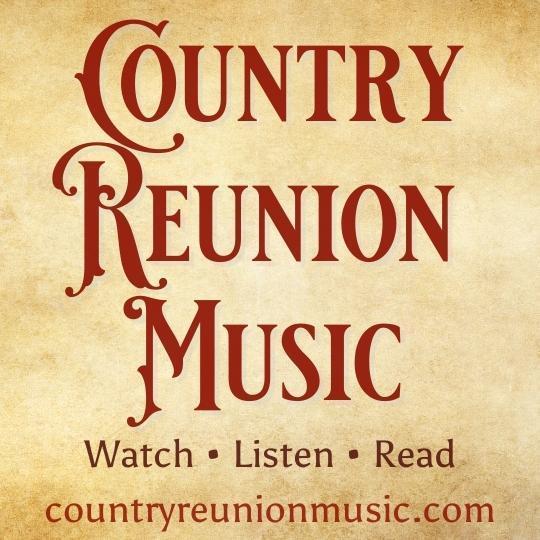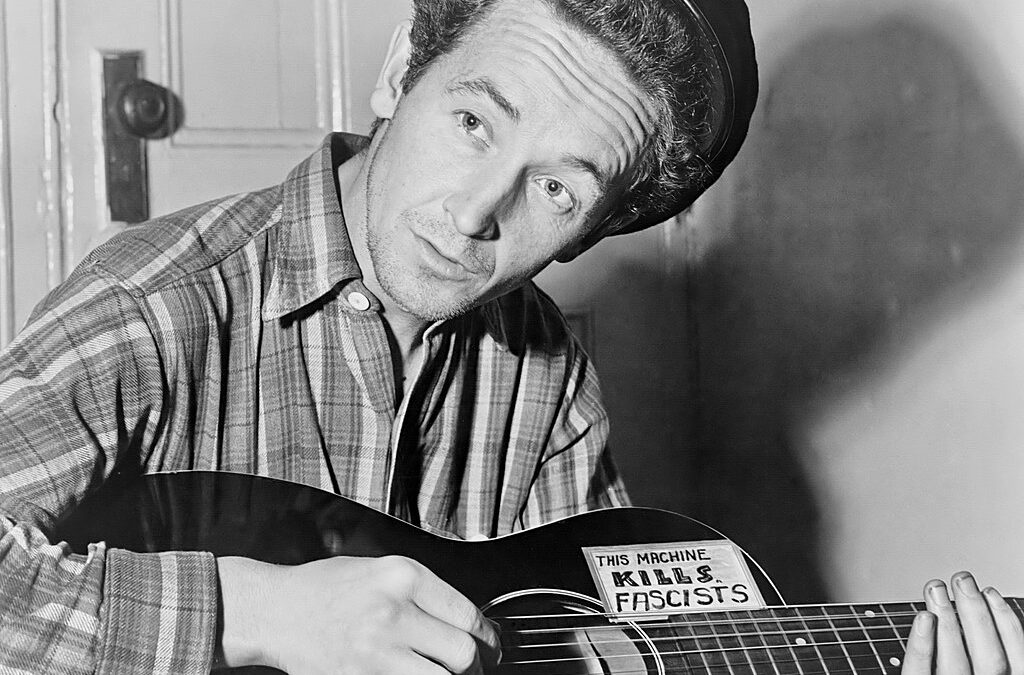Named after a New Jersey Democratic gubernatorial candidate who would later become president, singer-songwriter Woodrow Wilson “Woody” Guthrie wrote one of America’s most rousing and patriotic tunes, “This Land is Your Land,” and became one of America’s most significant figures in folk music. Many of his recorded songs, both original and traditional, are archived in the Library of Congress.
Guthrie was born in the small town of Okemah, Oklahoma, in July 1912, and each year since 1998 the Woody Guthrie Folk Festival has been held there on the weekend closest to his birthday.
Guthrie’s family was solidly middle class, but their lives were forever changed because of an inherited family disease and three separate deadly fires. Their Okemah homestead was destroyed beyond repair in the first fire. Then, when Guthrie was seven years old, his sister, Clara, burned to death after setting her clothes ablaze during a disagreement with her mother. Guthrie’s father, Charles, was severely burned during yet another house fire, marking the beginning of the Guthrie family’s financial decline.
In another tragic turn, Woody’s mother, Nora Belle, grew intensely ill, suffering the full impact of Huntington’s disease, which included extreme dementia. There was nothing the family could do for her, and she was institutionalized until her death in 1930.
As debts increased, the once-successful Charles began working in Pampa, Texas, following a series of failed real estate deals. When the children were left alone in Oklahoma and forced to work and beg for food, young Woody at age 14 felt responsible for his siblings.
Though Guthrie’s father had been a land speculator by trade, his love for music ran deep, and he introduced his son to a variety of musical styles such as Western, Scottish folklore and Native American music. When Guthrie also moved to Pampa in 1929, he found an outlet for his innate musical talent. He played at local dances with his uncle, Jeff Guthrie. He was introduced to the blues by an African American shoeshine boy named George, who played blues on his harmonica. Guthrie bought a harmonica and began playing with George on the street, collecting money for food from passersby.
After Guthrie married Mary Jennings in 1931, he joined her brother, Matt Jennings, and a friend, Cluster Baker, to form the “Corn Cob Trio” in hopes that it would bring light to their political messages and pure talent. The group was later referred to as the Pampa Junior Chamber of Commerce Band. However, Woody found it difficult to support his family through music during the Great Depression.
Woody’s father had been extremely active in conservative Democratic politics, which was at that time a radical movement that put him in the same groups that participated in African American lynchings and Ku Klux Klan activities. The political stance embraced by Guthrie and reflected in the folk and traditional music that carved his niche in the music world was a far cry from the leanings of his father.
In 1937 Guthrie began working for a Los Angeles radio station called KFVD. Guthrie joined the other musicians there to sing traditional or old-time music, and he managed to insert his original songs into the lineup. He also expressed his strong opinions about politics, law enforcement corruption, local and mainstream justice and what he thought the actual Jesus Christ would do or act like. The show had excellent ratings, and listeners across California liked what Guthrie had to say in a time where “new-fangled” ideas were decades from coming to the front lines. A few of Guthrie’s original songs, like “I Ain’t Got No Home,” “Goin’ Down the Road Feelin’ Bad,” “Talking Dust Bowl Blues,” “Tom Joad” and “Hard Travelin’,” captured the social and political turmoil of the era.
Guthrie was known as “the Oklahoma cowboy” by the time he relocated to New York in 1940, and he was warmly embraced by its folk music community. He became lifelong friends with theatrical performer and political activist Will Geer, who decades later became the beloved Grandpa on television’s “The Waltons.” In March 1940, Guthrie was invited to play at a benefit hosted by the John Steinbeck Committee to Aid Farm Workers to raise money for migrant workers. There he met and became close friends with folksinger Pete Seeger, further entrenching him into the folk music scene.
During Guthrie’s life, he wrote hundreds of political, folk and children’s songs, along with ballads and improvised works. His album of songs about the Dust Bowl period, Dust Bowl Ballads, is included on Mojo magazine’s list of “100 Records That Changed The World.”
Guthrie received numerous awards both in his lifetime and since his 1967 death associated with Huntington’s disease. A few of his accolades include the Pioneer Award in 2012, the U.S. Department of the Interior Conservation Service Award in 1966, the North American Folk Alliance Lifetime Achievement Award in 1996 and the National Academy of Recording Arts & Sciences Lifetime Achievement Award in 1999.
He was inducted into the National Songwriters’ Hall of Fame in 1970, the Nashville Songwriters’ Hall of Fame in 1977, the Rock and Roll Hall of Fame Museum in 1988 and the Oklahoma Hall of Fame in 2006.
From 1999 to 2002, the Smithsonian Institution Traveling Exhibition Service presented the traveling exhibit, “This Land Is Your Land: The Life and Legacy of Woody Guthrie.”
At the Woody Guthrie Center in Tulsa, Oklahoma, the public and researchers may view thousands of items related to Guthrie, including original artwork, books, correspondence, lyrics, manuscripts, media, notebooks, periodicals, personal papers, photographs, scrapbooks, unrecorded written lyrics and other special collections.
Guthrie was married three times and fathered eight children. One son, Arlo, is known for his music of protest against social injustice and storytelling around a song, carrying on the tradition of his celebrated father.
Story by By Sasha Kay Dunavant for Country Reunion Magazine.

